Breaking News: Epstein Victims Accuse Trump’s DOJ of Protecting ‘Wealthy Men’ Amid Calls for Full File Release
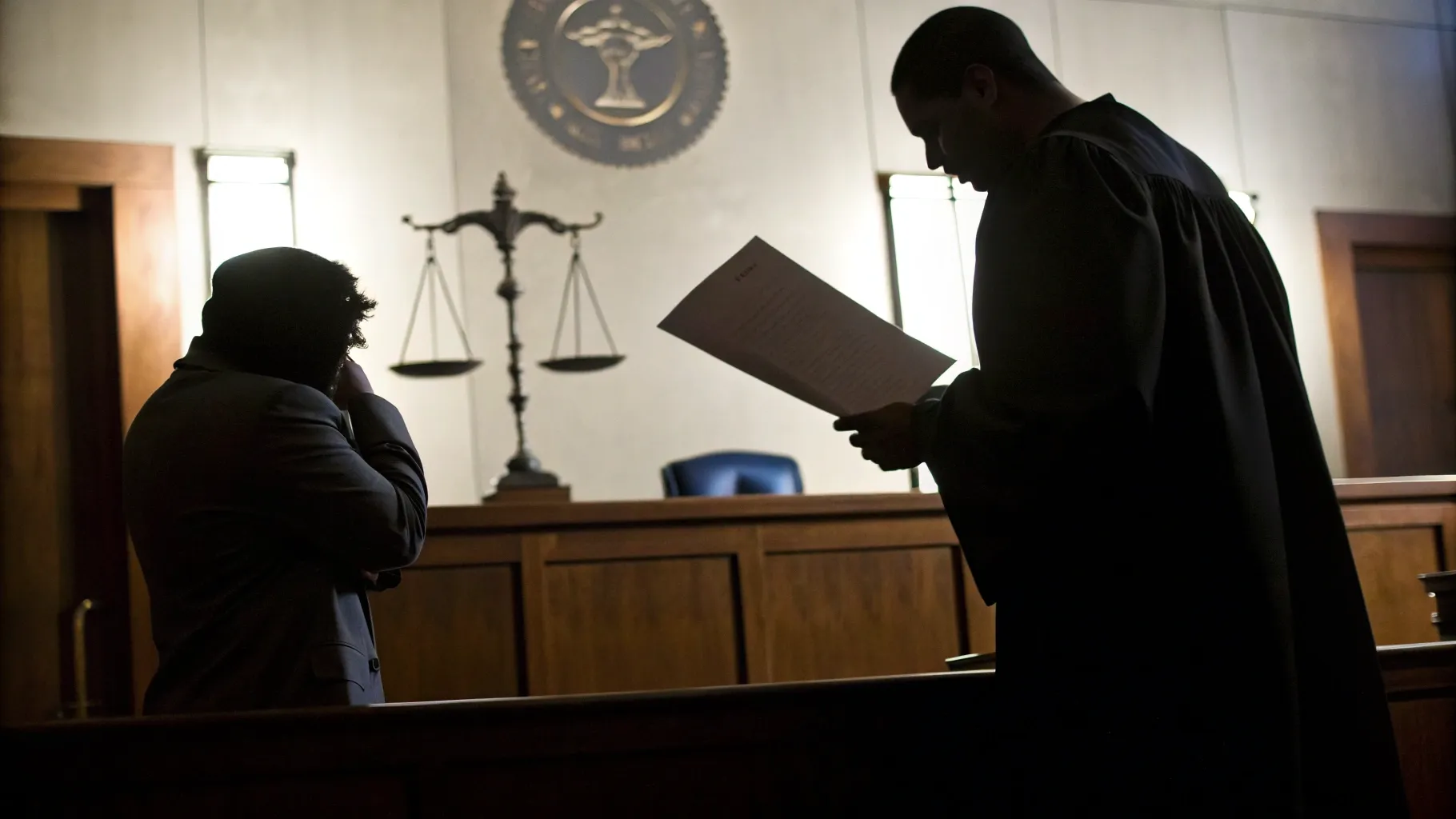
In a developing story that has captured national attention, two victims of Jeffrey Epstein have come forward with powerful statements accusing the Department of Justice (DOJ) under President Donald Trump of shielding “wealthy men” implicated in the Epstein scandal. These anonymous victims are demanding full transparency and the release of all Epstein-related files, while expressing frustration at what they describe as a lack of respect and protection from government agencies. This hot news update sheds light on ongoing efforts by Congress and the public to uncover the truth behind one of the most notorious sex trafficking cases in recent history.
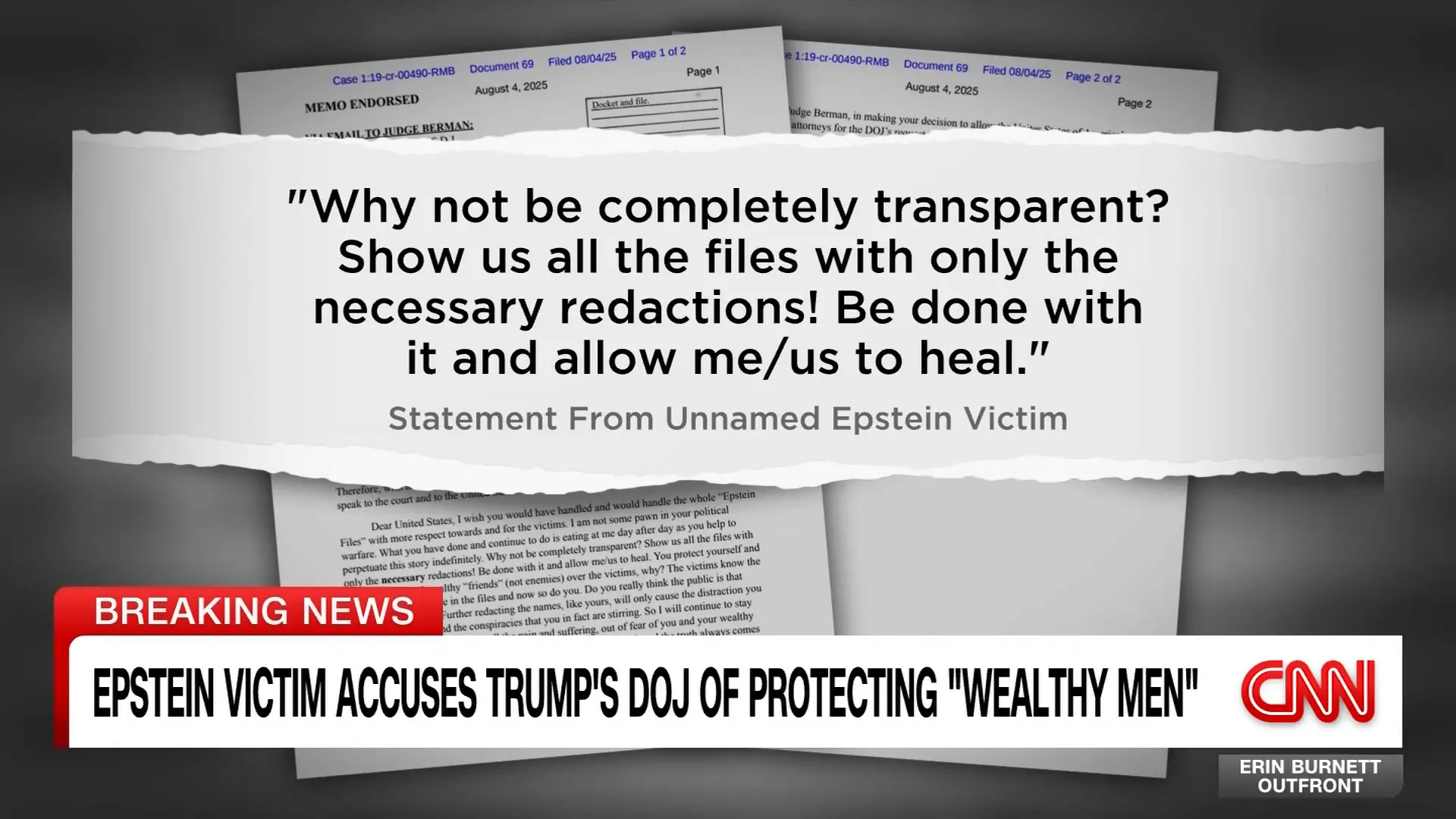
Victims Speak Out: Transparency and Protection Are Key
The victims have voiced their strong support for releasing grand jury transcripts related to Epstein’s case, but with an important caveat: the protection of victims’ identities and well-being. They urge the DOJ to be “completely transparent” and to disclose all files with only “necessary redactions” to prevent further trauma. One victim wrote, “Be done with that it and allow us slash me to heal,” emphasizing the need for closure through openness.
“I feel like the DOJ’s and FBI’s priority is protecting the third party, the wealthy men, by focusing on scrubbing their names off of files of which the victims know who they are.”
These statements also directly accuse President Trump of deploying “thousands of agents” to protect his identity and those of other high-profile individuals referenced in the files. Moreover, the victims criticize the current DOJ leadership for seeming more interested in engaging with Ghislaine Maxwell, the convicted sex trafficker, than in listening to the victims themselves.

Grand Jury Testimony: A Drop in the Bucket
The ongoing debate centers on whether to release grand jury transcripts, which currently include testimony from only two witnesses. While the DOJ acknowledges the limited evidence presented before this grand jury, victims and advocates argue that these transcripts are just a small fraction of the extensive files that hold critical information about Epstein’s network.
A judge is currently deciding if these transcripts, which are typically confidential, should be made public. Even if released, the transcripts alone are unlikely to satisfy demands for full transparency, as most evidence remains in the possession of the DOJ and the Attorney General’s office.
Congressional Pressure Builds for Full File Disclosure
Nearly two weeks ago, a bipartisan coalition on the House Oversight Committee—comprising three Republicans and several Democrats—voted to subpoena the DOJ for the full release of Epstein files, including documents and videos. However, despite public commitments, the subpoena has yet to be formally issued by the Republican committee chairman, James Comer.
Democratic Congressman Robert Garcia of California, a top Democrat on the Oversight Committee, shared insights on the delay. He confirmed that discussions about the subpoena’s language are ongoing and expressed hope that the subpoena would be issued imminently, possibly within days. Congressman Garcia stressed the importance of balancing transparency with victim protection, ensuring sensitive information is redacted to avoid retraumatizing survivors.
“We want to ensure that what we get also centers the victims. We don’t want to have is to revictimize or retraumatize the victims.”
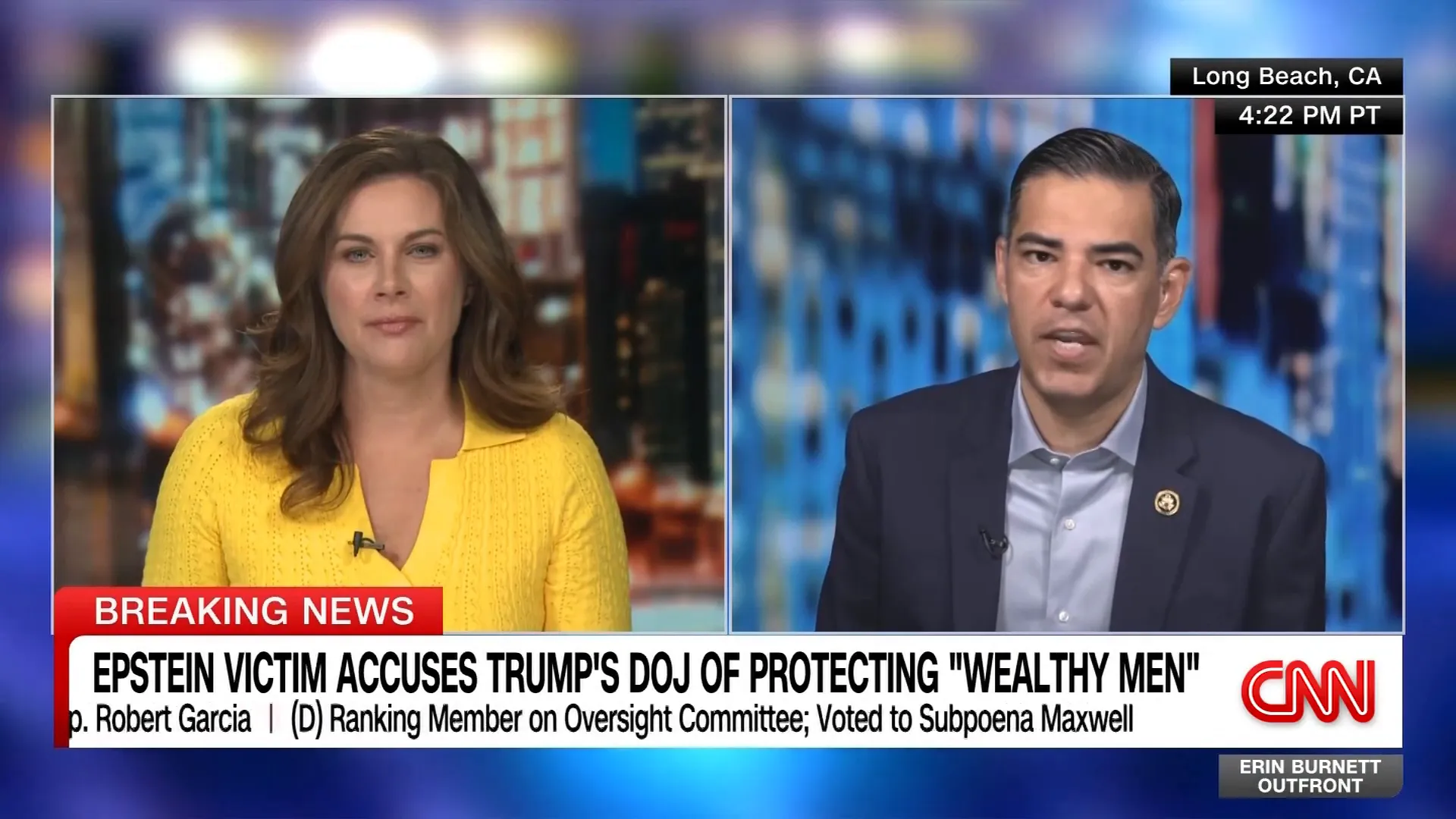
Holding Powerful Figures Accountable
One of the most contentious issues is whether the names of wealthy and influential individuals implicated in Epstein’s network will be released. Congressman Garcia underscored the bipartisan commitment to justice, regardless of an individual’s power, wealth, or political affiliation.
He was unequivocal in stating that the victims deserve accountability and that the files should be made public, saying, “It’s clear that Donald Trump is covering something up.” The DOJ has acknowledged that Trump’s name is among those in the files, fueling calls for full disclosure.
Controversy Surrounding Ghislaine Maxwell’s Prison Transfer
Adding to the complexity of the case is the recent transfer of Ghislaine Maxwell to a lower-security prison in Texas, a move unprecedented for a convicted child sex trafficker serving a 20-year sentence. This transfer followed two extensive meetings between Maxwell and Todd Blanche, the DOJ’s number two official and former personal lawyer to President Trump.
Critics, including Congressman Garcia, are deeply concerned about the timing and implications of this transfer. They suggest it may be part of an effort to secure a pardon or reduced sentence for Maxwell, potentially in exchange for testimony that shields more powerful figures, including Trump and his associates.
Garcia stated, “There’s no reason why Miss Maxwell was moved,” and warned that this pattern raises serious questions about attempts to “lionize” Maxwell or provide her cover.
The Road Ahead: Demand for Transparency and Justice
As the legal battles and political maneuvering continue, the victims, lawmakers, and public advocates remain steadfast in their demand for full transparency. The bipartisan vote in the House Oversight Committee signals strong congressional will to obtain and release the full Epstein files to the public.
However, the delay in issuing the subpoena by Chairman Comer and the unusual prison transfer of Maxwell highlight ongoing challenges in achieving justice. The coming days are critical, as victims, Maxwell, and others involved have until tomorrow to submit their input to the judge overseeing the grand jury transcript release.
Ultimately, the fight to expose the full extent of Epstein’s network and hold all perpetrators accountable is far from over. The pursuit of transparency and justice continues to be a pressing breaking news story that demands close attention.
News Update, News Today: Theatrics Over Action in Texas and Illinois Politics
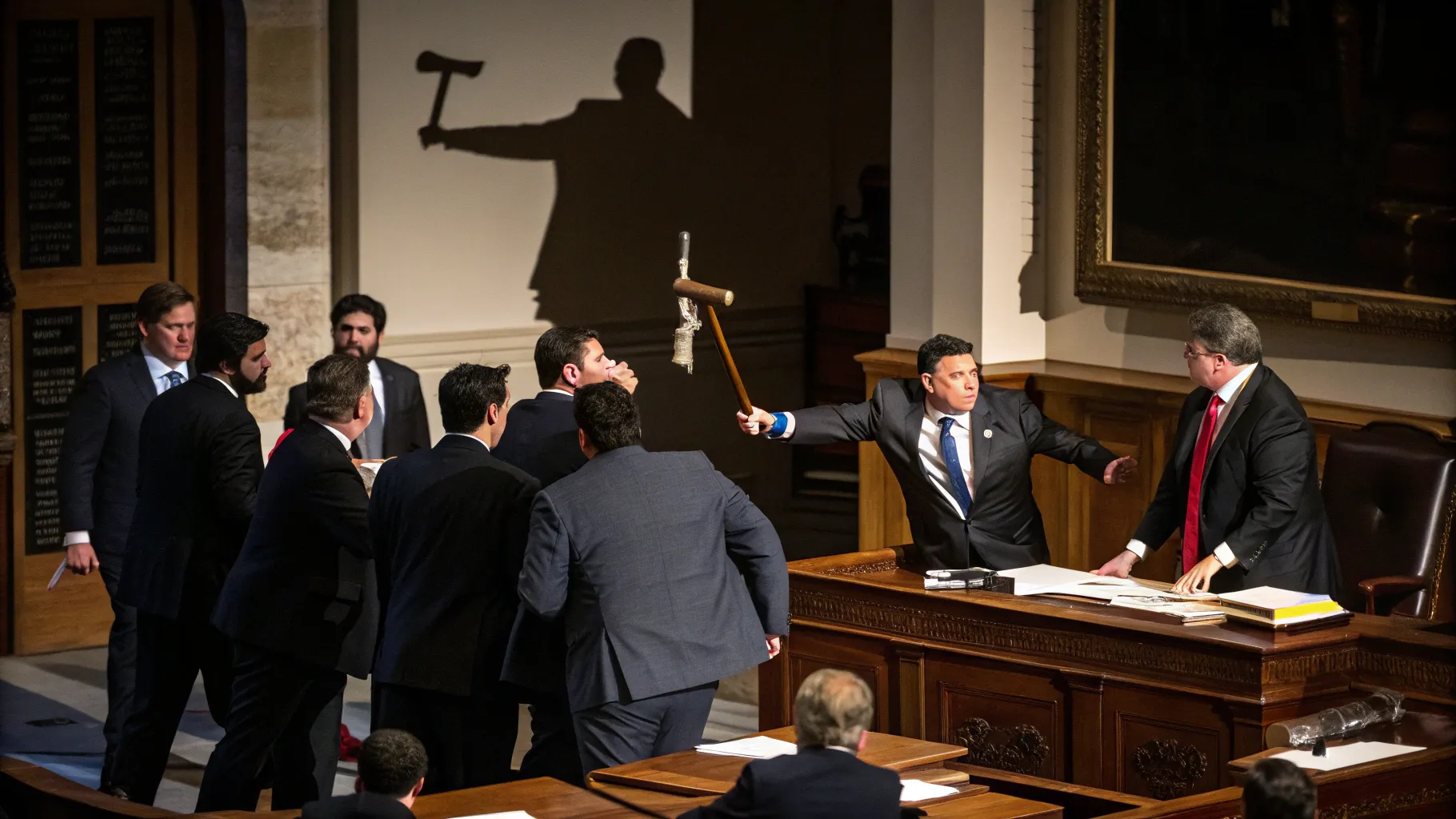
In the latest news update, news today shines a spotlight on the political drama unfolding between Texas Democrats and Illinois Governor JB Pritzker. The escalating tensions and strategic moves have made headlines, revealing a mix of political posturing and leadership challenges. Let’s dive into the heart of this unfolding story and unpack what it means for the states involved and political observers across the country.
The Texas Democrats’ Bold Move
Texas Democrats recently made a bold decision that has grabbed national attention—they left their home state to block a crucial vote. This was not a spur-of-the-moment stunt but a calculated move to protect their constituents. By fleeing Texas, they aimed to prevent legislation they opposed from passing, effectively using their absence as a political tool.
This act has been described by some as a “righteous act of courage,” highlighting the Democrats’ willingness to take extraordinary steps in defense of what they believe is right for their voters.

Governor JB Pritzker’s Role: The Chicago Connection
Meanwhile, in Chicago, Illinois Governor JB Pritzker has emerged as a key figure in this political saga. Acting somewhat like a “godfather,” Pritzker is lending a hand with messaging and support to the Texas Democrats. His involvement underscores the interconnectedness of Democratic leadership across state lines and their shared political challenges.
However, critics argue that Pritzker’s focus on the Texas Democrats’ act is a convenient distraction from his own leadership struggles at home. They suggest that “getting in on the Texas Democrats Act is easier for Pritzker than solving his own problems,” pointing to the difficulties Illinois faces under his governance.
Political Theater or Genuine Leadership?
Observers are divided on whether these actions represent genuine leadership or mere political theater. The Texas Democrats’ flight to block legislation is seen by supporters as a courageous defense of democracy and constituents’ rights. Detractors, however, dismiss it as a stunt, a tantrum from a “failed leader” trying to obstruct progress.
Similarly, Governor Pritzker’s involvement is viewed by some as an act of solidarity, while others see it as an attempt to capitalize on Texas’ drama rather than addressing his own state’s issues.
What This Means Going Forward
This political episode is a vivid example of how modern politics often plays out on a national stage, with leaders from different states influencing and reacting to each other’s actions. It raises important questions about the balance between political tactics and effective governance.
For Texas Democrats, the question remains whether their bold maneuver will yield the desired results or further polarize an already divided electorate. For Governor Pritzker, the challenge is whether he can translate his supportive role into tangible solutions for Illinois, moving beyond the optics of political messaging.
As these stories develop, staying informed with the latest news update, news today is crucial for anyone interested in American politics and governance. The interplay of courage, criticism, and political strategy continues to define the landscape, reminding us that in politics, actions often speak louder than words.
This article was created from the video All Dems have are stunts and tantrums: Laura Ingraham with the help of AI.
Breaking News: A Teen's Bold Move Away from Smartphones and the Rise of the Luddite Club

In today’s fast-paced digital world, smartphones and social media platforms are nearly inseparable from the daily lives of teenagers. Research indicates that nearly half of teens report using major social media platforms almost constantly, creating a culture deeply intertwined with technology. However, some young individuals are challenging this norm by intentionally stepping back from the screen-centric lifestyle. This article explores the inspiring story of Jamieson Butler, a Brooklyn high school senior who made the conscious decision to ditch her smartphone in favor of a flip phone and co-founded the Luddite Club—a community dedicated to living more mindfully away from screens.
The Early Relationship with Smartphones and Social Media
Jamieson’s journey with smartphones began early, around the age of ten or eleven, when she received a bright blue iPhone 5. Initially, her use was limited to games, and parental screen time limits were enforced, which kept her engagement with the device relatively low. However, as she entered her early teens, social media entered the picture and dramatically shifted her phone usage.
“When I got social media, things really took a turning point,” Jamieson recalls. By age twelve or thirteen, her screen time skyrocketed as she not only posted content but consumed vast amounts of videos and posts, many of which fascinated her despite a lack of media literacy. She describes the early internet content as mind-blowing, such as videos showing a phone made entirely out of cake.
The COVID-19 pandemic intensified this relationship, as lockdowns left her and many others with few alternatives but to spend extended hours on screens daily.
The Wake-Up Call: Recognizing an Unhealthy Relationship
Jamieson eventually realized that spending eight hours a day on her phone was unsustainable. A particularly jarring statistic she encountered was that the average American spends eight years of their lifetime on their phone. Whether or not the exact figure was accurate, it struck a chord with her.
“It just scared me so bad. I was like, what am I doing? This is crazy. Something has gotta change.”
Taking the Leap: From Smartphone to Flip Phone
Jamieson’s transition was not a sudden, one-day decision but a thoughtful process. She began by deleting all social media apps, expecting to return after a cleanse. Instead, she found an unexpected sense of relief and regained “eight hours of consciousness” each day. The stress and anxiety tied to social media use lifted, motivating her to take a bigger step.
An opportunity arose when her brother lost a fantasy football bet and had to use a flip phone for two weeks. They had a flip phone lying around, and Jamieson decided to adopt it permanently. She now uses a Sonim flip phone, a robust, military-grade device originally designed for security personnel, which she describes as a “brick” but perfect for her needs.
The Power of Community: Founding the Luddite Club
Realizing that going phone-free could feel isolating, Jamieson connected with a friend who shared similar feelings about smartphone overuse. This solidarity was crucial in sustaining their lifestyle change. Together, they launched the Luddite Club in their freshman year of high school to support teens seeking to reduce screen time.
Today, the Luddite Club has grown to about fifteen core members in Brooklyn, meeting regularly to engage in screen-free activities. Meetings range from embroidery workshops to outdoor games like tag and simply spending time having uninterrupted, face-to-face conversations. The club emphasizes the beauty of genuine, undistracted social interaction—something increasingly rare in a hyper-connected world.
Expanding the Movement: A National Nonprofit
What began as a local initiative has blossomed into a nationwide movement. The Luddite Club has transitioned into a nonprofit organization, inspiring similar groups across the United States, including in Colorado, Kentucky, California, and Washington D.C. Each chapter brings its unique flavor, focusing on interests like horticulture or physical movement, all united by the goal of reducing reliance on smart technology.
Facing Social Challenges and Misconceptions
Jamieson admits that not everyone understands or supports her choice. Some peers view her flip phone as a punishment or think she is being extreme. She often encounters defensiveness from friends who feel her decision challenges their own smartphone habits.
“People get very defensive, like me having a flip phone is an attack on them. They say things like, 'Are you grounded?' and I have to explain that I chose this for myself.”
Despite some social friction, Jamieson has found greater happiness and confidence since making the switch. Her academic engagement has increased, and she has cultivated new hobbies and interests, all while feeling less anxious and burdened.
Life Without a Smartphone: Benefits and Challenges
Jamieson describes how her quality of life has significantly improved. She loves school more than ever and enjoys reading and exploring new subjects. Her thoughts are clearer, and she feels freer and more authentic in her daily life.
However, living without a smartphone is not without its hurdles. QR codes, digital tickets, and other smartphone-dependent conveniences pose challenges. For example, concerts requiring Apple Wallet tickets are inaccessible to her, illustrating how technology increasingly assumes smartphone ownership as a given.
Despite these obstacles, Jamieson has adapted well. She navigates New York City confidently without Google Maps, appreciating the effort and mindfulness involved in finding her way.
Overcoming FOMO and Social Media Pressures
At first, Jamieson experienced some fear of missing out (FOMO). But she quickly realized that much of what she was missing—random posts about croissants, cats, or social gatherings—was not essential to her happiness. She also avoids the self-referential humor and trends that dominate online culture, often needing friends to explain internet slang.
She notes that social media’s addictive features, such as endless scrolling and algorithm-driven content, contribute to widespread mental health challenges among young people. This “doom scrolling” traps users in cycles of consumption, often leading to depression and anxiety.
Advice for Those Struggling with Smartphone Overuse
For anyone feeling overwhelmed by their phone use, Jamieson offers practical advice. One simple trick shared by members of the Luddite Club is switching the phone display to black and white. This reduces stimulation and makes scrolling less appealing, helping users become more aware of their screen time.
She also encourages finding alternative activities, like reading a good book, to fill the time usually spent on screens.
Looking Ahead: Maintaining a Flip Phone Lifestyle
Jamieson plans to continue using a flip phone through college and beyond, despite concerns about the increasing smartphone requirements in the workforce. She believes college is an ideal environment to try this lifestyle, especially on smaller campuses where the need for constant connectivity is less.
Her determination to resist the smartphone norm is firm, and she hopes to inspire others to rethink their relationship with technology.
Jamieson’s story is a compelling example of how stepping back from technology can lead to greater well-being and community connection. It challenges the prevailing assumption that smartphones are indispensable and offers a hopeful vision of a more mindful digital future.
News Update, News Today: Gabbard and Bondi Unite to Uncover the Truth Behind Russiagate

The ongoing grand jury investigation into the Russiagate controversy has taken a significant turn, with Director of National Intelligence Tulsi Gabbard and Attorney General Pam Bondi teaming up to “leave no stone unturned” in the quest for accountability. This news update, news today sheds light on the deep-rooted intelligence manipulation that shaped the narrative around the 2016 election, and the efforts underway to expose the truth and restore trust in America’s democratic institutions.
The Grand Jury Investigation: A Crucial Step Toward Accountability
After years of media narratives and political debates, the Department of Justice, led by Attorney General Pam Bondi, is actively pursuing a grand jury investigation into the Russiagate affair. Tulsi Gabbard emphasized the importance of this investigation as a necessary step toward transparency and restoring the integrity of the democratic republic.
“I met with the Department of Justice prosecutors today, and yes, they are committed to leaving no stone unturned as they conduct this grand jury investigation and find the truth,” Gabbard explained. The DOJ is requesting additional documents beyond those already declassified and publicly released, signaling a deep dive into the intelligence community’s actions and intentions during the 2016 election cycle.

Media Pushback and the Deep State Narrative
Despite the seriousness of these developments, many mainstream media figures have dismissed the investigation as “old news” or a politically motivated stunt. This reaction, according to Gabbard, is a familiar tactic employed by what she describes as the “deep state’s propaganda arm.”
Initially, the media ignored the release of critical documents. When ignoring was no longer an option, they downplayed the findings as conspiratorial or irrelevant. This pattern of denial and deflection aims to protect the narrative that has been pushed for years, even as new evidence emerges.
Gabbard warned that if these efforts to discredit the investigation fail, the next step will be to attack the credibility of those revealing the truth. She pointed out that this strategy has been used repeatedly against President Trump, herself, and others who challenge the established narrative.
Irrefutable Evidence Points to Obama’s Role in Russiagate
One of the most explosive revelations from the investigation is the documented involvement of former President Barack Obama in orchestrating the intelligence manipulation that fueled the Russiagate hoax. Gabbard highlighted evidence showing Obama’s direct order to convene a National Security Council meeting focused on Russia.
The report from that meeting included tasks assigned by James Clapper’s assistant to CIA Director John Brennan and other intelligence officials. Their mission: to create an intelligence assessment detailing how Russia allegedly tried to influence the 2016 election—not if, but how.
This assessment, however, was knowingly based on falsehoods, including the politically motivated Steele dossier, which had been discredited. The resulting Russiagate narrative was weaponized to delegitimize President Trump and launch what Gabbard describes as a years-long coup against his administration.
“The integrity of our democratic republic depends on the American people knowing the truth about what actually happened and seeking that accountability,” Gabbard asserted, emphasizing the gravity of a sitting president and top intelligence officials colluding to fabricate a narrative for political ends.
Facing Opposition: The Price of Truth-Telling
Gabbard’s vocal opposition to the Russiagate cover-up and the broader "forever war" mindset has made her a target within the political and intelligence communities. Democratic Senator Mark Warner publicly labeled her a threat to national security, demanding her removal—a move Gabbard dismisses as an attempt to silence dissent.
She points out that the tactics used against her mirror those historically deployed by Washington warmongers to suppress voices that challenge the status quo and expose deep state activities. According to Gabbard, the deep state comprises those bad actors within the intelligence community and media who manipulate information to maintain control and power.
Why Rooting Out Corruption in Intelligence Agencies Matters
Restoring public trust in agencies like the FBI, CIA, and NSA is crucial. Gabbard stresses that if these institutions continue to subvert democracy and undermine elected leadership, their funding and existence must be reconsidered.
She is actively working to identify and remove “deep state bad actors” within the intelligence community, stating, “Our country’s national security depends on it. The rule of law requires it. The integrity of our democratic republic requires that rooting out the truth, telling the truth to the American people, and bringing about that accountability.”
Furthermore, Gabbard calls for institutional reforms to prevent such manipulations from happening again, ensuring a more transparent and accountable intelligence apparatus moving forward.
Moving Forward: The Pursuit of Truth and Transparency
This news update, news today highlights a pivotal moment in American politics where truth and accountability are being fiercely pursued despite resistance from entrenched interests. The grand jury investigation, backed by tangible evidence and courageous whistleblowers, promises to shed light on the Russiagate deception and restore confidence in the democratic process.
For citizens seeking clarity, it is essential to critically evaluate media narratives and demand transparency from those who wield power. As Tulsi Gabbard and Pam Bondi demonstrate, uncovering the truth requires persistence, courage, and an unwavering commitment to justice.
This article was created from the video ‘NO STONE UNTURNED’: Gabbard and Bondi team up to ‘find the truth’ in ‘Russiagate’ with the help of AI.
News Update, News Today: The Democrats’ Texas Walkout and the Redistricting Battle Uncovered

In a recent, energetic discussion on the ongoing Texas redistricting battle, the situation unfolds as a dramatic political showdown with Democrats taking a controversial stand by breaking quorum. This news update, news today dives deep into the implications of their actions, the strategic moves by Republicans, and the broader national consequences. Let’s unpack the reality behind the headlines and explore what this means for democracy in Texas and beyond.
The Texas Democratic Walkout: A Pointless and Powerless Gesture?
For two days straight, Texas Democrats have staged a walkout, refusing to show up for work at the state capital in an attempt to block Republican-led redistricting efforts. This tactic, which some Democrats frame as “standing up” or “standing tall,” is seen by many as a desperate and ultimately futile effort to delay the inevitable.
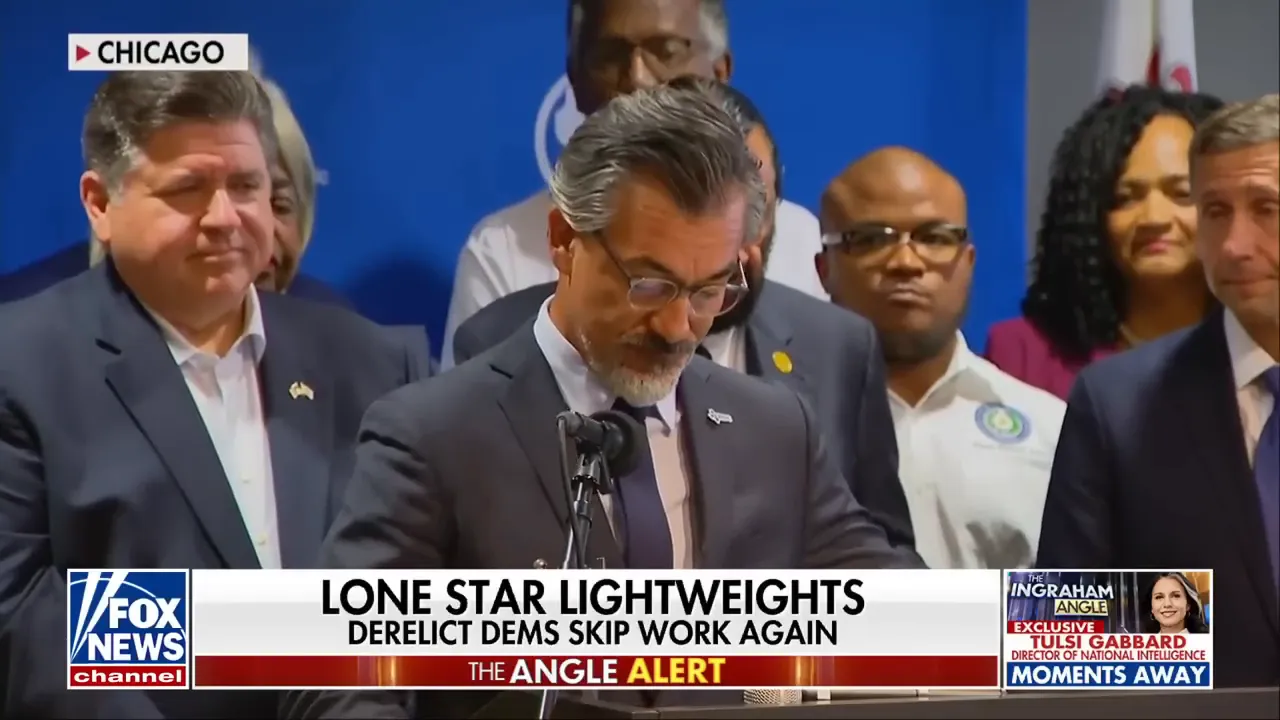
Despite the theatrical nature of this move, the reality is clear: the Republicans hold the power and the rules allow them to redraw districts to their advantage come 2026. This means Texas Republicans are poised to pick up additional seats, regardless of the Democrats’ absence.
The irony of the Democrats fleeing to Illinois—a state notorious for its own partisan gerrymandering—is not lost on observers. Illinois Democrats currently hold 14 out of 17 congressional seats despite Republicans receiving 47% of the vote, highlighting the hypocrisy in the Democrats’ protest.
Redistricting Realities: Both Sides Play the Game
Redistricting is a contentious issue, and it’s important to remember that both parties have engaged in this practice extensively. Democrats have been guilty of gerrymandering in states like New York, Illinois, and Maryland, creating oddly shaped districts that favor their candidates. For example, Maryland’s third district is infamously contorted, resembling an amoeba under a microscope.

This back-and-forth has bred cynicism about the fairness of the entire process. As one commentator put it, “There are no rules anymore, apparently,” reflecting the frustration over how the system operates in a way that often benefits the party in power.
The Rhetoric Escalates: From Democracy to All-Out War
Democratic leaders have escalated their rhetoric, framing the walkout as a fight to save democracy. Hakeem Jeffries called it an “all hands on deck moment,” warning that all options should be on the table to protect Texans’ rights.
However, critics argue that this is a case of “democracy subversion,” where Democrats abandon democratic norms and play the victim when they don’t like the outcome. This has led to fiery declarations, including comparisons to historic tragedies and calls for an “all-out war” by some Democratic voices.
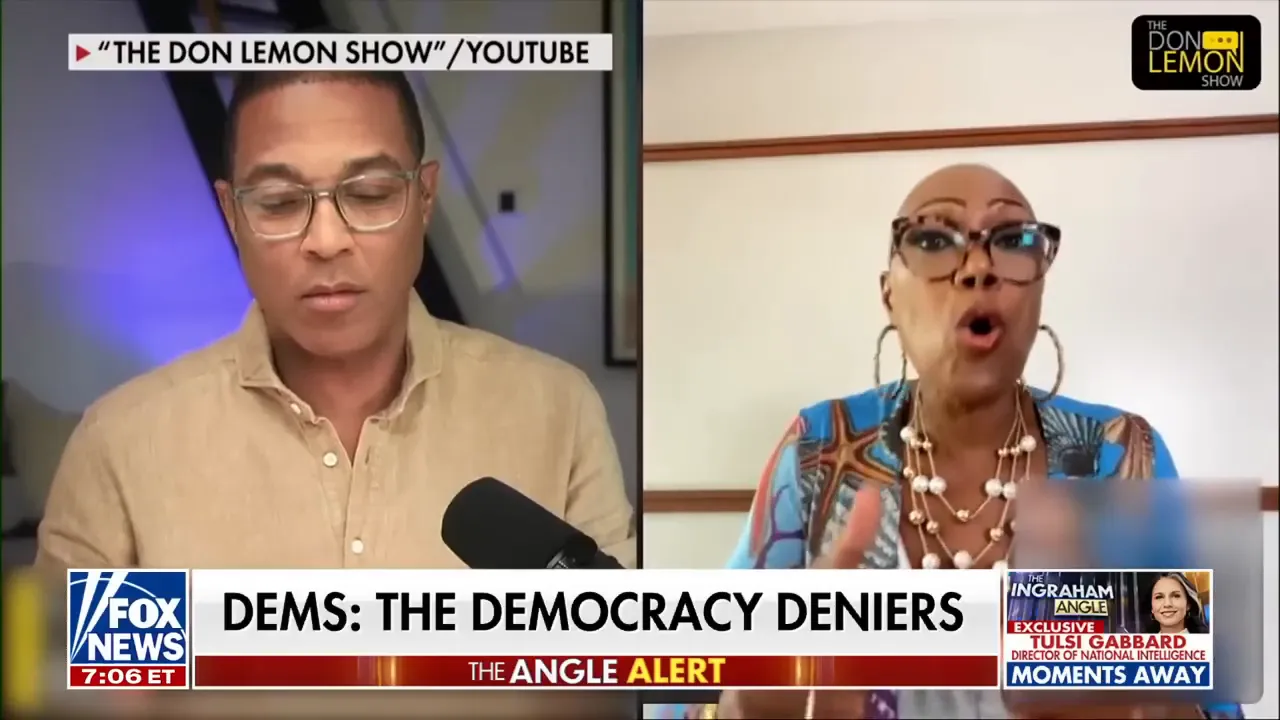
Such inflammatory language raises concerns about the potential for civil unrest. Some commentators suggest that Democrats are not just fighting for political gains but are actively seeking to destabilize the situation, encouraging other states like California and New York to adopt similarly aggressive tactics.
Republican Response and Legal Measures
On the other side, Republicans are firmly playing by the rules and preparing to push back. Texas Attorney General Ken Paxton has highlighted a recent Supreme Court ruling that could allow the arrest of absent lawmakers to restore quorum. Additionally, there is talk of removing some of the absent Democrats from office, a legal maneuver never before attempted.
Senator John Cornyn, eyeing the state primary and eager to appeal to the MAGA base, has even suggested involving the FBI to bring these lawmakers back to their seats. These escalating responses underscore the seriousness with which Republicans view the situation.
What This Means for Voters and the Future
At its core, this battle is about political power and control. Republicans argue that voters have elected their majorities fairly, and they are simply following the rules of the process. Meanwhile, Democrats appear to be running out of options and resorting to dramatic and divisive tactics.
The ongoing conflict serves as a stark reminder of how polarized and contentious American politics have become. For voters, it’s a clear choice: a party that governs and follows rules or one that emotes, rants, and plays the victim when things don’t go their way.
As this story continues to unfold, staying informed with the latest news update, news today is crucial. The Texas redistricting battle is not just a local issue; it reflects a national struggle over democracy, governance, and the future direction of the country.
Stay Informed and Engaged
Understanding the complexities of redistricting and the political maneuvers involved helps voters make informed decisions. It also sheds light on how political strategies impact representation and democracy itself.
Whether you’re in Texas or watching from afar, this is a pivotal moment in American politics. The choices made today will shape the political landscape for years to come.
This article was created from the video 'POINTLESS AND POWERLESS': The Democrats are playing you, Laura Ingraham warns with the help of AI.
